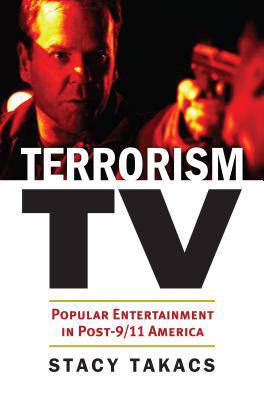
- Retrait gratuit dans votre magasin Club
- 7.000.000 titres dans notre catalogue
- Payer en toute sécurité
- Toujours un magasin près de chez vous
- Retrait gratuit dans votre magasin Club
- 7.000.0000 titres dans notre catalogue
- Payer en toute sécurité
- Toujours un magasin près de chez vous
Description
The Fox-TV series 24 might have been in production long before its premier just two months after 9/11, but its storyline--and that of many other television programs--has since become inextricably embedded in the nation's popular consciousness. This book marks the first comprehensive survey and analysis of War on Terror themes in post-9/11 American television, critiquing those shows that--either blindly or intentionally--supported the Bush administration's security policies. Stacy Takacs focuses on the role of entertainment programming in building a national consensus favoring a War on Terror, taking a close look at programs that comment both directly and allegorically on the post-9/11 world. In show after show, she chillingly illustrates how popular television helped organize public feelings of loss, fear, empathy, and self-love into narratives supportive of a controversial and unprecedented war. Takacs examines a spectrum of program genres--talk shows, reality programs, sitcoms, police procedurals, male melodramas, war narratives--to uncover the recurrent cultural themes that helped convince Americans to invade Afghanistan and Iraq and compromise their own civil liberties. Spanning the past decade of the ongoing conflict, she reviews not only key touchstones of post-9/11 popular culture such as 24, Rescue Me, and Sleeper Cell, but also less remarked-upon but relevant series like JAG, Off to War, Six Feet Under, and Jericho. She also considers voices of dissent that have emerged through satirical offerings like The Daily Show and science fiction series such as Lost and Battlestar Galactica. Takacs dissects how the War on Terror has been broadcast into our living rooms in programs that routinely offer simplistic answers to important questions--Who exactly are we fighting? Why do they hate us?--and she examines the climate of fear and paranoia they've created. Unlike cultural analyses that view the government's courting of Hollywood as a conspiracy to manipulate the masses, her book considers how economic and industry considerations complicate state-media relations throughout the era. Terrorism TV offers fresh insight into how American television directly and indirectly reinforced the Bush administration's security agenda and argues for the continued importance of the medium as a tool of collective identity formation. It is an essential guide to the televisual landscape of American consciousness in the first decade of the twenty-first century.
Spécifications
Parties prenantes
- Auteur(s) :
- Editeur:
Contenu
- Nombre de pages :
- 344
- Langue:
- Anglais
- Collection :
Caractéristiques
- EAN:
- 9780700618385
- Date de parution :
- 30-04-12
- Format:
- Livre broché
- Format numérique:
- Trade paperback (VS)
- Dimensions :
- 152 mm x 229 mm
- Poids :
- 517 g

Les avis
Nous publions uniquement les avis qui respectent les conditions requises. Consultez nos conditions pour les avis.






